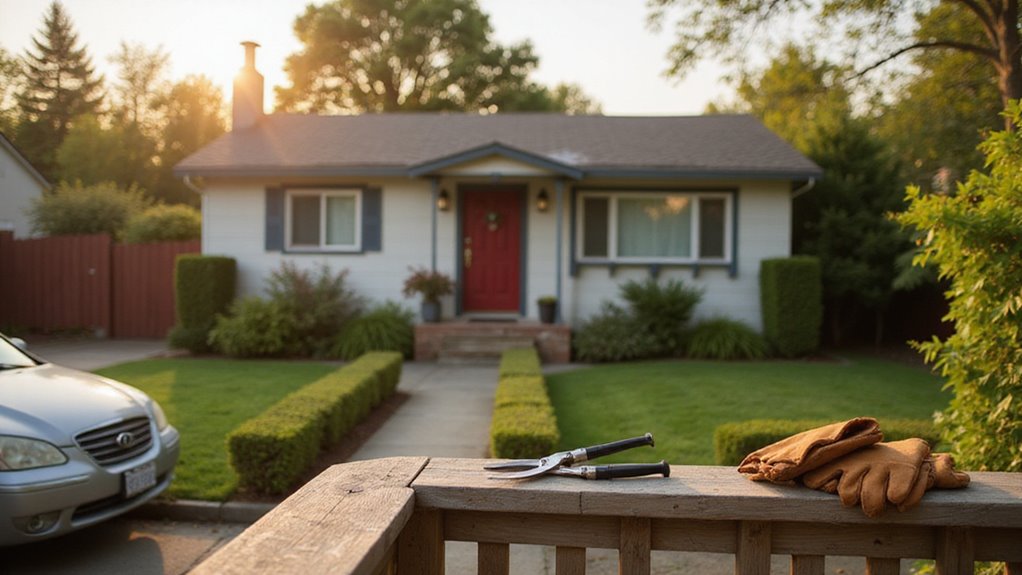Dealing with inherited property while grieving creates overwhelming emotional and financial challenges for many families. The complex legal requirements and time-sensitive decisions around inherited houses often leave heirs feeling stressed and confused. Multiple stakeholders, tax implications, and market uncertainties can further complicate the selling process. Fortunately, selling an inherited house for cash offers a straightforward solution with fewer complications and faster results.
You can sell an inherited house for cash after obtaining legal authority through probate and proper documentation. The process requires court approval to confirm your status as the rightful heir or executor.
Our comprehensive guide explores every aspect of selling inherited property for cash, from legal requirements to tax implications.
Key Takeaways
- Yes, you can sell an inherited house for cash after obtaining legal authority through probate court and completing the title transfer process.
- Cash buyers offer quick sales, typically closing within 30-90 days without requiring repairs or traditional market listings.
- The executor must secure probate court approval and written consent from all co-heirs before proceeding with any sale.
- Capital gains tax applies only to property value increases after inheritance, using stepped-up basis from the death date.
- Essential documents include probate court orders, new deed listing beneficiaries, professional appraisal, and proof of legal ownership transfer.
What is the Process of Selling an Inherited House?

Before you can sell an inherited house in Ohio, you’ll need to navigate the probate process, where the court confirms the will and authorizes the transfer of property. Once probate is complete, the executor must obtain court approval to transfer the title to the heirs. You can’t distribute sale proceeds until all estate debts, taxes, and claims are settled.
Understanding the Probate Process
Probate is a legal process that transfers property ownership after someone dies. A probate court must validate the deceased person’s will and officially name an executor. The executor handles the estate and obtains permission to sell inherited property.
The law requires several key steps before an Ohio property sale can proceed. The court reviews all documents and confirms the will’s authenticity. An appointed executor must receive formal authorization to conduct any property transactions.
Finally, the court transfers the property title to rightful heirs. This clear legal procedure safeguards everyone’s inheritance rights.
Title Transfer Requirements
A court order and new deed are required to transfer inherited property titles. The probate court must issue an official order that authorizes the property transfer to beneficiaries. The executor takes this order to the county recorder’s office. A new deed must list all beneficiaries as the legal owners.
For out-of-state properties, additional steps apply. Local title companies must verify documentation from both states’ probate courts. The transfer process enables beneficiaries to sell or manage the property legally. Professional guidance can simplify these legal requirements.
Estate Settlement Considerations
The estate must settle all debts before distributing assets to heirs. A complete inventory of assets and liabilities becomes the first required step. Payment of ongoing expenses like taxes, insurance, and maintenance must continue during probate.
An estate sale can help raise funds to pay outstanding debts and simplify the distribution process. After the probate court confirms all creditors receive payment, the executor can distribute remaining assets. Moreover, Ohio law determines asset distribution if no valid will exists.
In addition, proper documentation of all transactions helps prevent future disputes between beneficiaries. The settlement process typically takes several months to complete.
Do I Need Legal Permission to Sell an Inherited House?

Before you can sell an inherited house, you’ll need proper legal authority to proceed with the transaction. The executor named in the will must obtain probate court approval, and if you’re sharing ownership with other heirs, you’ll need their consent to move forward. Understanding these legal requirements upfront prevents delays and complications during the sale process.
Executor Authority
The executor receives legal power to sell inherited property after obtaining probate court approval in Ohio. A valid will must name the executor, or the court will assign an administrator if no will exists. The executor must act in the best interest of all heirs.
The executor’s first duty focuses on court requirements and documentation. All probate papers need proper filing before any property sale can begin. The executor must resolve estate debts and secure approval from beneficiaries.
Moreover, the executor maintains open communication with all parties involved. Legal guidelines require transparent updates about sale progress and fund distribution to heirs. This approach helps prevent disputes and ensures a smooth transfer process.
Co-Heir Consent Requirements
All co-heirs must provide written consent before selling inherited property. Legal documents require official signatures from each heir to complete a valid sale. Potential conflicts among heirs can disrupt the process.
To resolve disputes, heirs can seek professional mediation or legal intervention. A probate court partition action offers a last resort solution by forcing the sale. The court then divides proceeds fairly among all heirs according to their ownership stakes.
Moreover, early communication and clear documentation help prevent costly delays. Each heir should retain copies of signed agreements for their records.
Navigating Probate Court Approval
Your initial court hearing will be scheduled within 30-60 days after submitting the probate application. The judge reviews all documents and ensures proper procedures were followed. A successful approval grants legal authority to proceed with property transactions.
All beneficiaries must receive proper notification before the court date to protect their inheritance rights. Probate approval safeguards everyone’s interests in the sale. Moreover, this legal process prevents future disputes about property transfers.
Additionally, court approval becomes final after a mandatory 30-day waiting period. This timeline allows any objections to be filed. The court maintains records of all proceedings for future reference.
How to Handle Tax Implications When Selling Inherited Property?

When you sell an inherited property, you’ll face specific tax obligations that differ from a traditional home sale. The IRS grants you a step-up in basis to the property’s value at the date of death, which significantly reduces your capital gains exposure. You must understand how to calculate these taxes, identify available exemptions, and maintain proper documentation to minimize your tax burden and avoid costly mistakes.
Capital Gains Tax Calculations
Capital gains tax on inherited property applies only to value increases after inheritance, not prior gains. The IRS calculates taxes based on the difference between the sale price and property value at inheritance. This stepped-up basis method helps reduce your tax burden significantly. You must document the property’s fair market value on the inheritance date.
Keep detailed records of improvements and sale costs for accurate reporting. The tax rate varies from 0% to 20% based on your income bracket. Proper documentation makes tax filing straightforward and ensures maximum benefits.
Step-Up Basis Explained
A step-up basis resets an inherited asset’s value to its fair market value at the owner’s death. Your new tax basis becomes the property’s worth on the date of inheritance, not the original purchase price. This tax benefit reduces capital gains when you sell.
As a result, beneficiaries save significantly on taxes. A property bought for $100,000 and valued at $300,000 at death creates a new $300,000 basis. Additionally, taxes apply only to gains above the stepped-up amount. To establish this basis, obtain a professional appraisal at inheritance.
Tax Exemptions for Inherited Properties
Tax exemptions can reduce or eliminate taxes when you inherit property. Inherited properties receive a stepped-up basis to fair market value at the date of death. This adjustment often minimizes capital gains tax when you sell. Federal estate tax exemptions protect up to $12.92 million in 2023.
Your permanent residence in the inherited house qualifies for additional tax benefits. A tax professional can help identify local and state exemptions. Records of utility bills and property taxes strengthen your exemption claims.
Beyond these benefits, each state offers unique inheritance tax advantages. Several states exclude close relatives from inheritance taxes entirely.
Documentation Requirements for Tax Purposes
Essential tax documents for inherited property include fair market value assessments, ownership records, and expense receipts. A professional appraisal from the date of death establishes the property’s stepped-up tax basis. The original will and probate court documents prove legal transfer of ownership.
Furthermore, all repair costs, property improvements, and selling expenses must be documented to reduce taxable gains. Keep closing statements, bank records, and receipts in an organized file. These complete records help tax professionals maximize available deductions and ensure accurate returns.
What Are My Options for Selling an Inherited House?
You have several paths forward when selling your inherited property, each with distinct advantages and timelines. A traditional listing with a real estate agent maximizes your sale price through market exposure, while cash buyers offer speed and convenience by purchasing as-is. You can also investigate owner financing to attract more buyers or sell your individual share if you’re dealing with co-heirs who aren’t ready to sell.
Traditional Real Estate Listing
Traditional real estate listings offer the highest potential sale price for inherited properties. A licensed agent handles all marketing, showings, and negotiations with buyers. The process requires proper property preparation and patience to achieve maximum value.
Your agent will market the home across multiple platforms to attract qualified buyers. Most inherited homes sell for 15-20% more through traditional listings compared to quick sales. Professional representation ensures legal compliance and proper documentation throughout the sale.
As a next step, qualified agents can evaluate your inherited property and recommend strategic improvements. Each successful closing includes title searches, deed transfers, and final documentation through established channels.
Selling to Cash Home Buyers
Cash home buyers offer a simplified way to sell property without traditional real estate hassles. The process eliminates the need for repairs, renovations, or real estate agent involvement. A direct cash sale avoids open houses and complicated negotiations.
These buyers typically close within 7-14 days and purchase properties in any condition. Most cash offers range from 70-85% of market value. However, the speed and convenience often outweigh the lower price point.
As a result, this option works well for inherited homes, probate properties, or situations requiring quick sales. The streamlined approach helps multiple heirs distribute assets faster and resolve estate matters efficiently.
Owner Financing Possibilities
Owner financing lets property owners become direct lenders to their buyers. The seller accepts monthly payments instead of a full cash payment. This option works well for sellers who want long-term income rather than a lump sum.
Sellers can offer flexible down payments from 5% to 20% based on buyer qualifications. A legal contract protects both parties throughout the payment period. The property deed transfers only after the buyer completes all payments.
Moreover, this arrangement saves money on traditional bank fees and closing costs. The interest rates typically range from 6% to 12%, higher than conventional mortgages. Professional legal help remains essential for proper documentation and risk management.
Partial Interest Sales
Partial interest sales allow property owners to sell their individual share of jointly owned real estate. One heir can sell their ownership portion while others maintain their stakes in the property. This option provides quick access to cash without requiring agreement from all owners.
Different buyer types offer varying purchase amounts: co-heirs typically pay market value, investors offer 50-70%, and specialized funds pay 60-80% of the share’s worth. A proper valuation ensures fair pricing.
In most cases, the sales process takes between 7 to 60 days, depending on the buyer type. Before pursuing a partial sale, property owners should first explore buyout options with co-heirs. Documentation and clear communication remain essential throughout this process.
How to Deal with Multiple Heirs?

When multiple heirs inherit a property, you’ll need unanimous agreement to sell, which requires creating a fair division plan for the proceeds. If consensus isn’t possible, you can investigate buyout arrangements where one heir purchases the others’ shares, or pursue legal mediation to resolve disputes. Ohio probate courts can intervene when heirs can’t reach an agreement, potentially ordering a partition sale to divide the property or its value.
Creating a Fair Division Plan
A fair division plan requires three essential steps to protect all heirs’ interests when sharing inherited property. A certified appraiser must determine the property’s current market value before any decisions are made. Each heir’s legal share gets calculated based on the will specifications or state inheritance laws. The executor should document these percentages clearly.
Written agreements protect everyone involved in the property division. All heirs must sign documents outlining sale proceeds distribution, maintenance costs, and closing fee responsibilities. These formal steps prevent future family conflicts and ensure transparency throughout the process.
Buyout Arrangements
A buyout allows one heir to purchase other heirs’ shares of inherited property for full ownership. The process requires a professional appraisal to determine each heir’s fair market value share. The buying heir must secure funds through a mortgage, personal loan, or available cash.
Legal documentation protects all parties in the transaction. Written agreements must specify the purchase terms, price, and payment timeline. Each heir needs to sign property transfer documents and register them with the local county recorder’s office. As a result, this arrangement prevents future ownership conflicts.
Handling Disagreements Among Heirs
The best approach to handle heir disagreements is through structured mediation and clear documentation. A neutral mediator helps siblings work through emotional and financial conflicts over inherited property. Each heir should express their goals and concerns openly.
Professional mediation saves time and money compared to lengthy court battles. Ohio law requires all heirs to agree before selling or transferring inherited property. The probate court can force a property partition if mediation fails.
Practical solutions include property buyouts between heirs or splitting proceeds based on contributions. After that, written agreements protect everyone’s interests and prevent future disputes.
Legal Mediation Options
Court-appointed mediators help resolve inheritance disputes through structured negotiation sessions. Ohio probate courts provide professional mediators at lower costs than traditional litigation. The process allows families to maintain relationships while solving property disagreements.
A neutral mediator guides conversations about property sale decisions and profit distribution. Each party maintains control over final agreements, unlike court-ordered solutions. The mediator cannot force decisions but helps find common ground.
If mediation fails, courts may require a partition sale of the inherited property. The sale proceeds get divided based on legal ownership percentages. This final option ensures resolution when other methods prove unsuccessful.
What Challenges Might I Face When Selling?
Common challenges in selling a property can include market conditions, legal requirements, and financial obstacles. Most sellers face extended timelines of 30-90 days before closing their property sale. The real estate market fluctuates, which affects both pricing and buyer interest. Price negotiations often lead to stressful back-and-forth discussions with potential buyers.
Beyond these factors, property condition problems may demand expensive repairs or renovations. Title issues or existing liens must be resolved before any sale proceeds. Furthermore, emotional attachment to the property can cloud judgment during important decisions. Legal requirements vary by state, with documentation and disclosure rules adding complexity to the process.
How to Prepare an Inherited House for a Quick Sale?

You’ll need to systematically prepare your inherited property to attract serious cash buyers and close quickly. Start by removing all personal belongings, completing necessary repairs, and assembling required legal documentation from probate proceedings. Getting a professional appraisal establishes fair market value and provides the tax documentation you’ll need for capital gains calculations.
Clearing Personal Belongings
How to Clear Personal Belongings from an Inherited Property Remove all personal items before listing an inherited house for sale. A vacant property sells faster and appeals to more buyers. The process requires careful planning and organization.
Three effective methods exist for clearing belongings. An estate sale converts furniture and collectibles into cash. Local charities welcome donated items and provide tax deductions. Professional cleanout services handle large-scale removal efficiently.
Take photos and document valuable items for estate records before disposal. Empty spaces allow potential buyers to visualize their future home. The property will also look more attractive in listing photos.
Essential Repairs and Updates
Focus first on necessary repairs that affect home functionality and safety. Essential repairs include fixing leaky faucets, broken windows, faulty wiring, and damaged flooring. Replace worn or outdated fixtures to modernize the space without excessive costs.
A fresh coat of neutral paint and deep carpet cleaning can transform spaces affordably. Keep documentation of completed repairs and improvements for buyer transparency. Moreover, these basic updates prevent common buyer objections during negotiations.
Remember to prioritize repairs that matter most to home value and marketability. Beyond that, limit cosmetic changes to those with proven returns on investment.
Proper Documentation Assembly
Essential property documents must be properly assembled before selling an inherited house. A date-of-death property appraisal sets the fair market value for capital gains calculations. This document protects heirs from future tax issues. A thorough title search uncovers existing liens or debts against the property.
In addition, current utility statements prove active services and proper maintenance. HOA paperwork verifies compliance with community rules and fee payments. These records create a transparent history for potential buyers.
Moreover, complete documentation speeds up the sales process. Clear records minimize legal risks and simplify negotiations with buyers.
Professional Valuation Considerations
Professional appraisers determine accurate property values to guide pricing decisions. A formal appraisal establishes the stepped-up tax basis needed for IRS reporting and capital gains calculations. The appraiser reviews local market data and property conditions to set fair market value.
Moreover, appraisal reports serve multiple legal purposes during inheritance. This documentation satisfies probate court requirements and helps divide assets fairly among heirs. To prevent delays, experts recommend scheduling an appraisal immediately after acquiring inherited property.
Conclusion
Selling an inherited house for cash provides a faster and simpler solution than traditional real estate transactions. The process eliminates common hurdles like repairs, multiple showings, and lengthy closing periods. When you choose this route, you can quickly convert your inherited property into immediate funds.
At Prestige Investments Cincinnati, we specialize in buying inherited properties across Ohio’s major cities. We handle all the paperwork and legal requirements to make the process smooth for our clients. Our team works directly with executors and beneficiaries to ensure proper documentation and swift closings.
We understand that managing an inherited property can be overwhelming during a difficult time. Our cash offers provide a straightforward solution without the need for repairs or renovations. If you have an inherited house in Cincinnati or nearby Ohio cities, we can help transform your property into cash within weeks.





